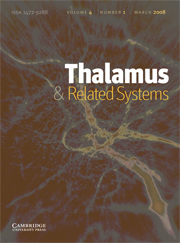Crossref Citations
This article has been cited by the following publications. This list is generated based on data provided by
Crossref.
Fins, Joseph J.
2003.
Constructing an ethical stereotaxy for severe brain injury: balancing risks, benefits and access.
Nature Reviews Neuroscience,
Vol. 4,
Issue. 4,
p.
323.
Fins, Joseph J.
2004.
Neuromodulation, free will and determinism: lessons from the psychosurgery debate.
Clinical Neuroscience Research,
Vol. 4,
Issue. 1-2,
p.
113.
DOBKIN, BRUCE H.
2004.
Neurobiology of Rehabilitation.
Annals of the New York Academy of Sciences,
Vol. 1038,
Issue. 1,
p.
148.
Shirvalkar, Prasad
Seth, Malika
Schiff, Nicholas D.
and
Herrera, Daniel G.
2006.
Cognitive enhancement with central thalamic electrical stimulation.
Proceedings of the National Academy of Sciences,
Vol. 103,
Issue. 45,
p.
17007.
John, E. Roy
2006.
The sometimes pernicious role of theory in science.
International Journal of Psychophysiology,
Vol. 62,
Issue. 3,
p.
377.
Schiff, N. D.
Giacino, J. T.
Kalmar, K.
Victor, J. D.
Baker, K.
Gerber, M.
Fritz, B.
Eisenberg, B.
O’Connor, J.
Kobylarz, E. J.
Farris, S.
Machado, A.
McCagg, C.
Plum, F.
Fins, J. J.
and
Rezai, A. R.
2007.
Behavioural improvements with thalamic stimulation after severe traumatic brain injury.
Nature,
Vol. 448,
Issue. 7153,
p.
600.
Wijnen, V.J.M.
van Boxtel, G.J.M.
Eilander, H.J.
and
de Gelder, B.
2007.
Mismatch negativity predicts recovery from the vegetative state.
Clinical Neurophysiology,
Vol. 118,
Issue. 3,
p.
597.
Schiff, Nicholas D
and
Fins, Joseph J
2007.
Deep brain stimulation and cognition: moving from animal to patient.
Current Opinion in Neurology,
Vol. 20,
Issue. 6,
p.
638.
Mair, Robert G.
and
Hembrook, Jacqueline R.
2008.
Memory Enhancement with Event-Related Stimulation of the Rostral Intralaminar Thalamic Nuclei.
The Journal of Neuroscience,
Vol. 28,
Issue. 52,
p.
14293.
Schiff, Nicholas D.
2008.
Central Thalamic Contributions to Arousal Regulation and Neurological Disorders of Consciousness.
Annals of the New York Academy of Sciences,
Vol. 1129,
Issue. 1,
p.
105.
Schiff, N. D.
Giacino, J. T.
Kalmar, K.
D.Victor, J.
Baker, K.
Gerber, M.
Fritz, B.
Eisenberg, B.
Biondi, T.
O’Connor, J.
Kobylarz, E. J.
Farris, S.
Machado, A.
McCagg, C.
Plum, F.
Fins, J. J.
and
Rezai, A. R.
2008.
Schiff et al. reply.
Nature,
Vol. 452,
Issue. 7183,
p.
E1.
Giacino, Joseph T.
and
Schiff, Nicholas D.
2009.
The Neurology of Consciousness.
p.
173.
Schiff, Nicholas D.
2009.
Central Thalamic Deep‐Brain Stimulation in the Severely Injured Brain.
Annals of the New York Academy of Sciences,
Vol. 1157,
Issue. 1,
p.
101.
Schiff, N. D.
2009.
Textbook of Stereotactic and Functional Neurosurgery.
p.
2981.
Aru, Jaan
and
Bachmann, Talis
2009.
Occipital EEG correlates of conscious awareness when subjective target shine-through and effective visual masking are compared: Bifocal early increase in gamma power and speed-up of P1.
Brain Research,
Vol. 1271,
Issue. ,
p.
60.
Schiff, Nicholas D.
2010.
Recovery of consciousness after brain injury: a mesocircuit hypothesis.
Trends in Neurosciences,
Vol. 33,
Issue. 1,
p.
1.
Hirschberg, Ron
and
Giacino, Joseph T.
2011.
The Vegetative and Minimally Conscious States: Diagnosis, Prognosis and Treatment.
Neurologic Clinics,
Vol. 29,
Issue. 4,
p.
773.
Schiff, Nicholas D.
2012.
Moving toward a generalizable application of central thalamic deep brain stimulation for support of forebrain arousal regulation in the severely injured brain.
Annals of the New York Academy of Sciences,
Vol. 1265,
Issue. 1,
p.
56.
2013.
Brain Stimulation.
Vol. 116,
Issue. ,
p.
295.
Schiff, N. D.
Shah, S. A.
Hudson, A. E.
Nauvel, T.
Kalik, S. F.
and
Purpura, K. P.
2013.
Gating of attentional effort through the central thalamus.
Journal of Neurophysiology,
Vol. 109,
Issue. 4,
p.
1152.

